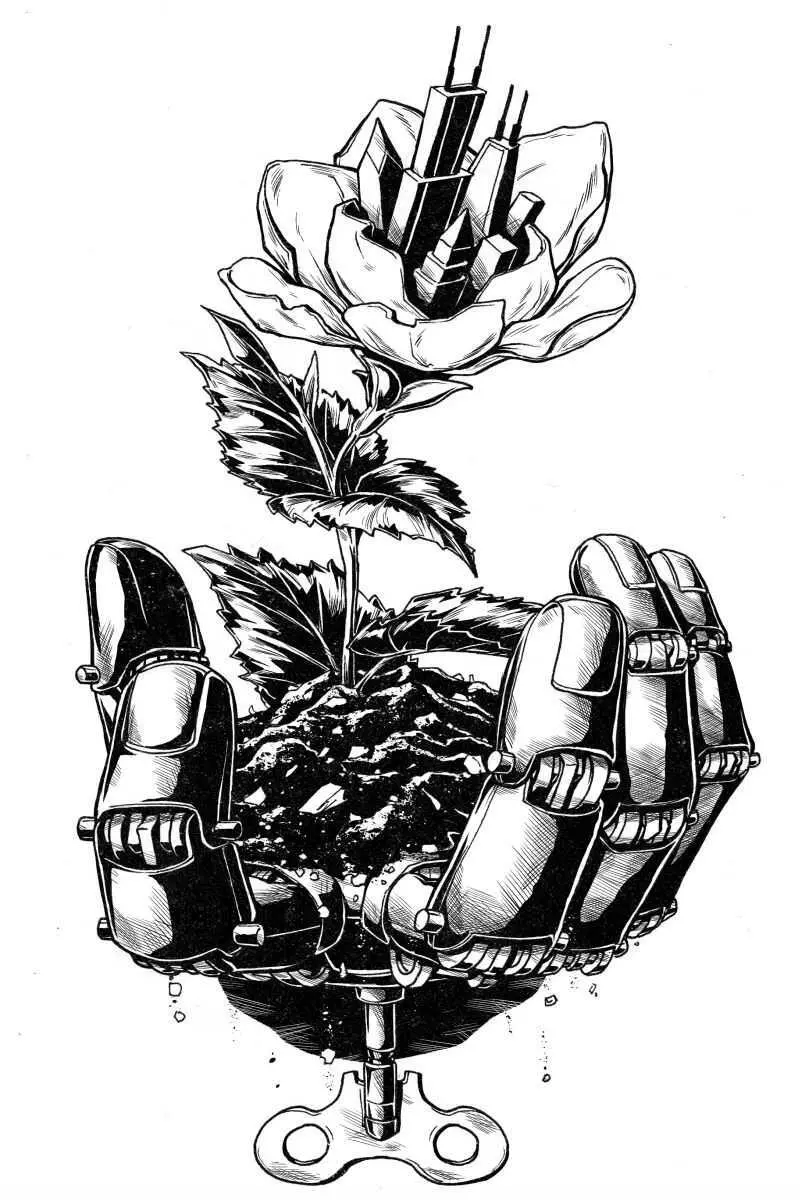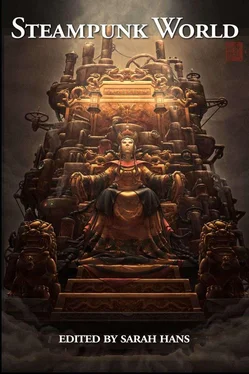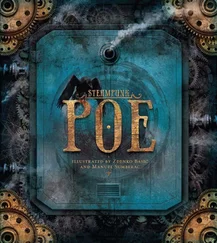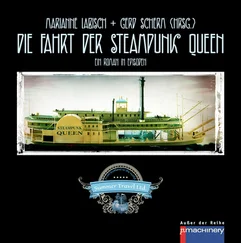The sky full of ominous clouds didn’t help Ilyapa’s mood or her energy level, but she pushed on, keeping in step with the others. She glanced upward frequently as they reached the top and filed into position, expecting the perfect final touch of drenching rain at any moment, and it was during one of those glances that she saw the massive shape in the air above the Wall, emerging from the clouds, followed by another, and another. Her involuntary yelp earned sharp looks from the irritable wives around her, until they noticed the ships— dirigibles , the Amerigans called them—and reacted even more strongly by clutching at each other, pointing, and embarrassing themselves with babbling and tears. On the terraced walkways and streets below, waves of reaction rippled through the crowds. Even the well-trained llamas, despite being accustomed to battle chaos, began to groan fearfully in the strange tension.
And that was when the metal giant appeared, striding mechanically toward them from the opposite end of the Wall with the Coya’s own cart following close behind him. He wore a tall royal headdress, made of metal feathers instead of real ones, and he carried a colorful bundle in his arms: the Sapa Inca, Ninan Cuyochi, cradled within the device which served as his Voice.
The members of the oligarchy, known to the public only as high advisors and honored citizens, had been arranged in a semicircle facing the approaching dirigibles, but now they all turned to watch as the Coya was helped down from her vehicle, followed by Bachue, Sapa Inca’s attendant and interpreter. The two women preceded the metal man, walking toward Villac-umu, the high priest. He greeted the Coya as usual, while the advisors shuffled and hesitated as Ilyapa had never seen them do before. The crowd began to settle, curiosity overtaking fear.
Villac-umu, in his rich speaking voice, called out, “I welcome Yupanqui Capac, the son and heir of the Sapa Inca Ninan Cuyochi and the Coya Pachama!”
The metal giant raised his free left hand to wave, still holding the Sapa Inca in his right.
“The gods have informed me that this modern age requires a young, vigorous, and powerful new Emperor. They have placed the spirit-son of Ninan Cuyochi and Pachama in this metal vessel to create our new Sapa Inca, Yupanqui Capac. The Coya will now ask the Emperor if he wishes to object.”
Ilyapa’s understanding clicked into place. She stepped forward, watching avidly, not caring a bit for the rank of other wives.
The Coya said, loudly, “Ninan Cuyochi, do you wish to object to this transition?” She reached up to push the button on his device that would prompt an answer, and Yupanqui Capac leaned down to allow her access.
How does the device work ? Ilyapa wondered. How does it know what to do ?
The Emperor’s Voice whirred into operation. The Coya jerked back, looking to Villac-umu, who shrugged slightly. A cord began to emerge from the device, displaying a short sequence of knots. Bachue hurried forward to examine the cord.
“You will become an honored sacrifice to the gods," she stated in a carrying voice.
The Coya shrieked. She turned on Villac-umu furiously, gesturing with both hands as she launched into a series of curses and insults. He stepped backward, holding up his hands in front of him. The Coya turned to the giant metal man and spoke. Ilyapa couldn’t tell what she said, but he began to walk toward the Panama-side edge of the Wall and the dirigibles that hovered above it. Ilyapa could see pale faces watching through the clear walls in the nearest one’s riding section. No one had tried to come out yet; she wondered what they were waiting for. Yupanqui Capac stopped in front of it and tilted his head to look up, surprisingly lifelike.
The metal giant raised his arms to lift the Sapa Inca over his head. Slowly, he pulled his hands backward. For a long moment he paused there, and Ilyapa thought, No, he wouldn’t . But then the giant flung the Sapa Inca Ninan Cuyochi and his Voice with enough force that the apparatus hit and cracked the dirigible before dropping to the ground far, far below, in Panama.
All sanity broke down. The Sapa Inca’s wives turned to run away, screaming. Llamas fought their handlers, braying their anxious noises again and spraying spit in all directions. Shoving, shouting, and shrieking erupted. Ilyapa put all of her remaining energy into standing still and watching, despite the battering of frightened women pushing past.
The Amerigans, clearly agitated, seemed to be arguing behind their cracked wall. Some peered through what she thought were the seeing tubes she had heard about at university. Maybe she could examine one when they landed, she thought. But then the lead dirigible began to move up and backward, away from Viracocha’s Land, and the others went with it.
Ilyapa found widowhood to be tolerable. She thought of her late husband fondly, but without regret, as he had lived an extraordinarily long life. Immediately after the Coya was sacrificed, it became apparent that performance evaluations would be necessary in Ilyapa’s department. Khuno received an evaluation so unsatisfactory that the oligarchy sent him to work on the maintenance of mining devices far away, in the southernmost gold mine of Viracocha’s Land.
The new Sapa Inca wasn’t terribly complicated. His giant size allowed one of his specially-trained “brothers" to climb inside and operate his body when necessary. Although the Amerigans didn’t return to visit for a long time afterward, Ilyapa thought her step-son was much more handsome than his father had been, and she enjoyed working on his Voice.

Mary Sundown and the Clockmaker’s Children
Malon Edwards
I reach thirty-five miles an hour the moment I see the pinprick of light leading to the surface. My stride is smooth; my clockwork is fluid.
And then, I stumble. Another explosion has rattled the north passage of the LaSalle Street Tunnel.
It takes me just a fraction of a second to recover my balance and regain my speed, despite the incline and the sifted dirt and flakes of concrete shaken loose. It’s a treacherous floor. The Chicago River has found its way in, too. One misstep, and I won’t ever run again.
As the tunnel mouth looms large, I accelerate piti a piti—little by little. I hit forty-five miles an hour when I burst into the daylight and my feet touch the cobblestones on Kinzie Street.
I’m out! I almost shout to Marie-Louise through the aetherlink we once shared, but then I remember: she’s dead. Broken. Crushed by Zonbi Robot.
The very same Zonbi Robot leveling its Dahlgren guns at me now.
Lè Marie-Louise te eseye fè m fache—.
Ah. Excuse me. I apologize. Allow me to say that again.
When Marie-Louise tried to piss me off, which was often, she would say I killed papa nou—our father, the Clockmaker—because he built me last and I was the most difficult of his children to assemble.
Sometimes, when she said that, I would remind Marie-Louise papa nou crippled his once strong brown hands and blinded his once sharp brown eyes fashioning the fine springs and small gears he gave my three hundred ninety-nine brothers and sisters. Long before he built me.
Other times, I would answer Marie-Louise by showing her how long and shiny my middle finger is.
Like I show Zonbi Robot now. It doesn’t seem too happy about that. But then, neither was Marie-Louise.
It takes less than half a second for me to realize I’m not the target of Zonbi Robot’s Dahlgren shell guns. It’s aiming behind me, at the rebuilt Chicago Board of Trade Building.
Читать дальше













